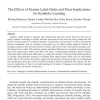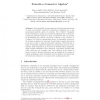106 search results - page 18 / 22 » LIDA and a Theory of Mind |
COGSCI
2010
13 years 6 months ago
2010
Symbols enable people to organize and communicate about the world. However, the ways in which symbolic knowledge is learned and then represented in the mind are poorly understood....
NN
2008
Springer
13 years 6 months ago
2008
Springer
dely acknowledged that categorically organized abstract knowledge plays a significant role in high-order human cognition. Yet, there are many unknown issues about the nature of ho...
ISOLA
2010
Springer
13 years 5 months ago
2010
Springer
Interoperability of heterogeneous networked systems has yet to reach the maturity required by ubiquitous computing due to the technology-dependent nature of solutions. The Connect ...
Publication
Most e-learning environments which utilize user feedback or profiles, collect such information based on questionnaires, resulting very often in incomplete answers, and sometimes de...
CEC
2011
IEEE
12 years 6 months ago
2011
IEEE
Abstract—Memetics is a new science that has attracted increasing attentions in the recent decades. Beyond the formalism of simple hybrids, adaptive hybrids and memetic algorithms...


